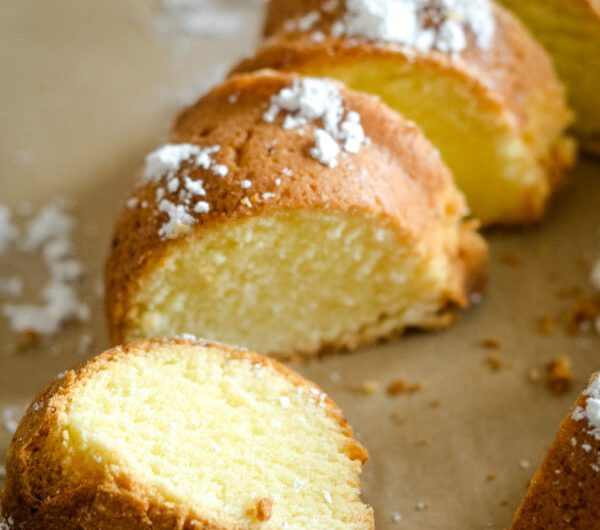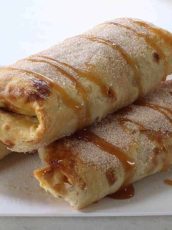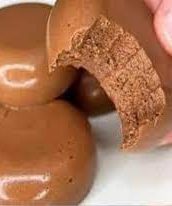This protein-rich Cottage Cheese Bread recipe is a simple and quick option for those craving homemade bread. You only need five ingredients, and there’s no need for yeast, eggs, or complex flours. What you get is a moist, fluffy bread that’s perfect for sandwiches, toasts, or enjoying with your favorite spreads.
Why You’ll Love This High-Protein Cottage Cheese Bread Recipe
- Minimal Ingredients: With just 5 basic ingredients, you can whip up this bread with no hassle.
- Quick and Easy: Skip the tedious wait for dough to rise or rest—this bread is ready in less time compared to traditional recipes.
- Protein Boost: Thanks to cottage cheese, each slice of this bread delivers 6 grams of protein, making it a healthier option than plain white bread.
- Tastes Like Regular Bread: No compromise on flavor! This bread tastes just like regular homemade bread, with a perfect texture for all your bread-based cravings.
Ingredients You’ll Need
Here are the five key ingredients for this easy cottage cheese bread:
- Flour: I recommend using all-purpose flour, but several other flour types can work well (we’ll discuss this later).
- Baking Powder and Salt: These two are essential for making the bread rise and giving it that perfect flavor. If you have self-rising flour, you can skip these two.
- Milk: You can use any type of milk—whole milk, low-fat, or skim milk. For those who prefer plant-based options, unsweetened soy or almond milk works well too.
- Cottage Cheese: Use 2% cottage cheese for the right balance of flavor and moisture. If possible, choose small curds for a more uniform texture.
Making Cottage Cheese Bread
Now, let’s walk through the process of making this high-protein bread in just a few simple steps. The entire process only takes a few minutes of preparation time.
1. Preheat and Prep
- Start by preheating your oven to 375°F (190°C).
- Line a 9×5-inch loaf pan with parchment paper. This will prevent the bread from sticking to the pan and make it easier to remove later.
2. Mix the Dry Ingredients
- In a large bowl, combine 3 cups of all-purpose flour, 1 ½ tablespoons of baking powder, and 1 ¼ teaspoons of salt.
- Use a whisk to ensure that the baking powder and salt are evenly distributed throughout the flour.
- Sift the dry mixture into another large bowl using a fine mesh sieve. Sifting is an essential step to improve the texture and consistency of your bread.
3. Add the Wet Ingredients
- Pour 1 ½ cups of milk and 1 cup of cottage cheese into the dry ingredients.
- Use a spatula to gently stir the ingredients together until everything is just combined. Be careful not to overmix—the dough should be thick and slightly sticky, but still spreadable.
4. Transfer to Loaf Pan
- Pour the dough into the prepared loaf pan and smooth out the top with your spatula.
5. Bake
- Bake the bread for about 70 minutes, or until a toothpick inserted into the center comes out mostly clean, with just a few crumbs sticking to it.
- If the top of the bread starts to brown too quickly, loosely cover it with aluminum foil to prevent over-browning.
6. Cool and Slice
- Let the bread cool in the pan for about 5 minutes, then carefully transfer it to a wire rack to cool completely, which takes about an hour.
- Once cooled, slice the bread into 10 even pieces using a serrated knife.
Expert Tips for Perfect Cottage Cheese Bread
Follow these baking tips to ensure that your cottage cheese bread turns out perfectly every time:
- Measure Your Flour Correctly: Spoon the flour into your measuring cup and level it off with a knife. Avoid scooping the cup directly into the flour bag, as it can lead to packed flour and result in dense bread.
- Sift the Flour: Sifting helps to improve the texture of your bread, creating a lighter, more consistent loaf.
- Check Dough Consistency: The dough should be thick, sticky, but still spreadable. Depending on the brand of flour or cottage cheese, you may need to adjust the amount slightly.
- No Need to Drain the Cottage Cheese: Cottage cheese adds moisture and texture to the bread, so leave it as is to retain the delicious pockets of cheese in the final product.
- Toasting Brings Out Flavor: Toasting this bread enhances its flavor and gives it a delightful crispy texture. It’s also great for sandwiches or even making French toast!
Different Flour Options You Can Use
While all-purpose flour works best, you have a few other options if you want to tweak the recipe:
- Self-Rising Flour: Skip the baking powder and salt if you use this type of flour. The ratio of flour to other ingredients remains the same.
- Whole Wheat Flour: For a heartier option, whole wheat flour can be used. You may need to add a bit more milk to get the right dough consistency.
- Gluten-Free Flour: A 1:1 gluten-free flour blend should work, although I haven’t tested this specifically for cottage cheese bread.
- White Whole Wheat Flour or Pastry Flour: You can use these as a direct substitute without needing to adjust the recipe.
Flavor Additions and Variations
You can easily customize this cottage cheese bread to your taste by adding herbs, seeds, or even nuts. Here are some suggestions:
- Herbs: Add up to 1 teaspoon of fresh or dried herbs like rosemary, thyme, or oregano for added flavor.
- Seeds: Mix in a tablespoon of poppy seeds, sesame seeds, or flaxseeds for a nutritional boost and texture.
- Nuts: Chopped walnuts or almonds give the bread a lovely crunch.
- Dried Fruits: Add 1/3 cup of dried fruits such as cranberries or raisins for a hint of sweetness.
- Cheese: Mix in shredded cheddar or Parmesan for a richer taste.
- Cinnamon: Add 1-2 teaspoons of cinnamon to the dough for a warm, aromatic twist. You can even sprinkle cinnamon sugar on top before baking for a sweet touch.
Storage Tips
- To Store: Wrap the bread in a linen towel and keep it at room temperature for up to 2 days. For longer storage, transfer it to an airtight container or plastic bag and keep it for an additional 2 days.
- To Freeze: Let the bread cool completely before freezing. Place it in a Ziploc bag and remove as much air as possible. You can freeze it for up to 3 months. When ready to eat, let the bread thaw at room temperature for several hours or overnight.
Frequently Asked Questions
Can I Use Low-Fat Cottage Cheese?
Yes, you can use low-fat cottage cheese, but the texture may be slightly drier. To maintain moisture, you could try adding a bit more milk.
Is There a Vegan Version of This Bread?
Yes, you can use plant-based milk and dairy-free cottage cheese for a vegan option. Just make sure the milk has a neutral flavor, like unsweetened almond milk.
How Long Does the Bread Stay Fresh?
The bread stays fresh at room temperature for up to 2 days. After that, you can extend its freshness by storing it in an airtight container or freezing it.






